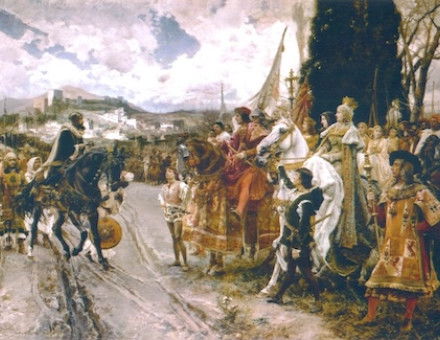Cultural Decolonisation: UNESCO & Africa
John D. Hargreaves discusses cultural reconstruction and its political implications.
The minister for overseas Development, announcing British withdrawal from UNESCO recently, claimed that its cultural work had become 'harmfully politicised'. Forty years ago European governments could see more clearly that culture often has unavoidable political implications. Britain and France showed this, not only by sponsoring UNESCO itself, but by initiating cultural reconstruction in their own colonial empires. New, or reformed, University institutions at Ibadan and Legos, Dakar and Khartoum, Makerere and Salisbury, were conceived to educate future African leaders in the culture and values of the imperial rulers.
Teachers engaged in this 'second colonial invasion' (of whom I was one) were not motivated by any intention to perpetuate colonial control. Like earlier generations of Christian missionaries, we were convinced of the universal validity of science and scholarship as developed in the West. But, like those missionaries, most of us under-valued – or, in a few cases, rejected – the culture and values of our students' societies.
Historians were among the first to appreciate the need for cultural decolonisation. At first, African students enthusiastically followed courses prescribed in Paris, London or Durham; some acquired an admiration for Napoleon, Cromwell or Bismarck which still influences their country's politics. But the better students, and their better teachers, have understood that not only syllabuses but methods had to change in order to promote deeper understanding of the African past. The scale of this change is being registered by UNESCO in its internationally-planned General History of Africa, half of which has now been published. Though inevitably uneven in quality and sometimes already dated in approach, this series will provide libraries throughout the world with historical data and perspectives, substantially accredited by an international scholarly community, which were largely hidden from us forty years ago.
Other arts disciplines have also changed. Musicologists and art historians have always found rich material in African cultures. From the 1950s, departments of English literature, while still hesitating to admit 'primitives' like Amos Tutuola to their canon, nurtured writers like Achebe, Soyinka and Ngugi who interpreted African experience within the 'great tradition'. The place of African languages within a national culture is however still problematic – and often politically sensitive, as Ngugi has discovered to his cost. African religions, too, are increasingly studied and understood in their own terms, rather than as mere paganisms or heresies, and African contributions to Christianity and Islam appreciated.
In other sectors of the map of learning adaptation is proving more complex. While physical scientists may perhaps legitimately claim that their studies are universally valid and culture-free, social and natural scientists have always seen the importance, and the intellectual value, of applying their methods to African data. But how far this process has stimulated development and adaptation of questions posed within the disciplines themselves seems to vary considerably. In medicine those who want to give priority to the pervasive problems of epidemology and public health still struggle for resources against rigid requirements laid down by professional corporations elsewhere, who prefer to use high-cost technology to advance the frontiers of surgical and medical practice.
Perhaps the most neglected front in the struggle for cultural decolonisation concerns the application of modern technologies within the development programmes of African governments. The interest of the enthusiastic technologist (and of the industries which he promotes) often lies in substituting capital-intensive machinery for unskilled or semiskilled labour. Computers which cannot be serviced locally, and which are dependent on erratic power-supplies, are imported to replace Africans in clerical or manipulative grades – who are meanwhile being trained in increasing numbers by the schools. Such is the prestige (and the selling power) of technological culture.
Still more seriously, inappropriate agricultural machinery and exotic crop varieties are imported in vain pursuit of 'Green Revolutions', while the received wisdom of African farmers long accustomed to coping with their environment is too often neglected by the planners (though there are signs of improvement). Fishing and farming are parts of culture, just as much as sculpture and dance; but development experts do not always acknowledge it, and historians have sometimes encouraged their neglect. Even if UNESCO is not ideally constituted to resolve such issues, it was one of the few international bodies with authority to try.
Teachers engaged in this 'second colonial invasion' (of whom I was one) were not motivated by any intention to perpetuate colonial control. Like earlier generations of Christian missionaries, we were convinced of the universal validity of science and scholarship as developed in the West. But, like those missionaries, most of us under-valued – or, in a few cases, rejected – the culture and values of our students' societies.
Historians were among the first to appreciate the need for cultural decolonisation. At first, African students enthusiastically followed courses prescribed in Paris, London or Durham; some acquired an admiration for Napoleon, Cromwell or Bismarck which still influences their country's politics. But the better students, and their better teachers, have understood that not only syllabuses but methods had to change in order to promote deeper understanding of the African past. The scale of this change is being registered by UNESCO in its internationally-planned General History of Africa, half of which has now been published. Though inevitably uneven in quality and sometimes already dated in approach, this series will provide libraries throughout the world with historical data and perspectives, substantially accredited by an international scholarly community, which were largely hidden from us forty years ago.
Other arts disciplines have also changed. Musicologists and art historians have always found rich material in African cultures. From the 1950s, departments of English literature, while still hesitating to admit 'primitives' like Amos Tutuola to their canon, nurtured writers like Achebe, Soyinka and Ngugi who interpreted African experience within the 'great tradition'. The place of African languages within a national culture is however still problematic – and often politically sensitive, as Ngugi has discovered to his cost. African religions, too, are increasingly studied and understood in their own terms, rather than as mere paganisms or heresies, and African contributions to Christianity and Islam appreciated.
In other sectors of the map of learning adaptation is proving more complex. While physical scientists may perhaps legitimately claim that their studies are universally valid and culture-free, social and natural scientists have always seen the importance, and the intellectual value, of applying their methods to African data. But how far this process has stimulated development and adaptation of questions posed within the disciplines themselves seems to vary considerably. In medicine those who want to give priority to the pervasive problems of epidemology and public health still struggle for resources against rigid requirements laid down by professional corporations elsewhere, who prefer to use high-cost technology to advance the frontiers of surgical and medical practice.
Perhaps the most neglected front in the struggle for cultural decolonisation concerns the application of modern technologies within the development programmes of African governments. The interest of the enthusiastic technologist (and of the industries which he promotes) often lies in substituting capital-intensive machinery for unskilled or semiskilled labour. Computers which cannot be serviced locally, and which are dependent on erratic power-supplies, are imported to replace Africans in clerical or manipulative grades – who are meanwhile being trained in increasing numbers by the schools. Such is the prestige (and the selling power) of technological culture.
Still more seriously, inappropriate agricultural machinery and exotic crop varieties are imported in vain pursuit of 'Green Revolutions', while the received wisdom of African farmers long accustomed to coping with their environment is too often neglected by the planners (though there are signs of improvement). Fishing and farming are parts of culture, just as much as sculpture and dance; but development experts do not always acknowledge it, and historians have sometimes encouraged their neglect. Even if UNESCO is not ideally constituted to resolve such issues, it was one of the few international bodies with authority to try.




